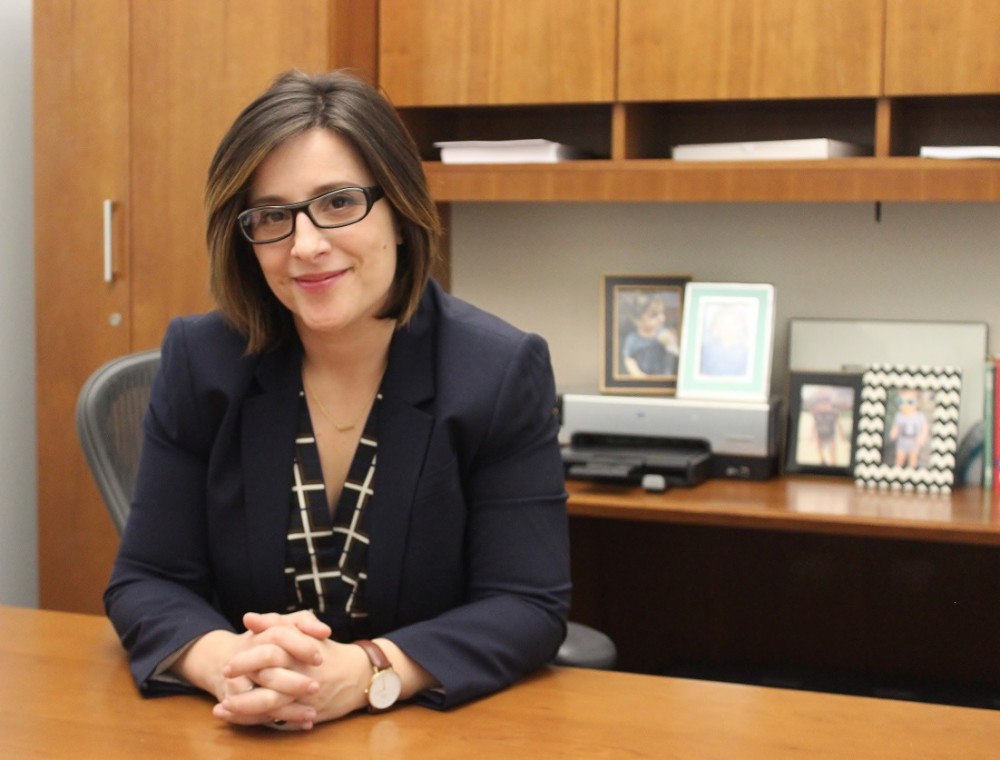Q & A with JFS’ New CEO
‘JFS serves everyone during times in their lives when they are vulnerable.’

Basha Silverman took the helm of Jewish Family Services of Delaware as CEO in December, succeeding JFS’ long-time CEO Dory Zatuchni when she retired at the end of the year.
A native Delawarean, Basha has deep personal and professional connections in the First State and a passion for Jewish social services. Prior to joining JFS, she was responsible for driving program development and visions for growth at the nearby Jewish Family and Children’s Service of Philadelphia.
You’ve worked in the human services field for 15 years – what put you on this path?
My parents ran a small business selling baby furniture in Wilmington called Closic’s Furniture. I grew up in that store selling furniture on weekends all through high school and college. With each potential sale, I got caught up talking to the couple about their family and their baby. Their social interactions, the family dynamics were far more compelling to me than which style of crib would work best for them. Looking back, it’s clear to me that it was always the people that I cared about – more than the furniture or the profit margins.
While I was in college, I also started volunteering at an agency that provided social services. I soon realized that the business savvy that I gained working in the store could be valuable in reaching my goal to help people. After that, I was committed to the social service world. I went on to earn my Master’s degree in Social Work. And I have never looked back. I feel so grateful that I have found a career path that allows me to follow my passion.
What excited you about JFS when you accepted this position?
Everything I’ve done professionally in Delaware and in Philly prepared me for this position. I feel almost like its tailor-made for my background, my passions, and my career experience.
I wouldn’t have come back to Delaware to run just any nonprofit. I fell in love with the JFS mission in Philly – how the organization is inspired by the Jewish principles of welcoming the stranger, repairing the world, honoring truth and integrity. The way we operate as consummate professionals ethically guided by our values makes me proud to be in a leadership position at any JFS. So to come back to my home state of Delaware, to utilize those Jewish principles and values, and to make a real, positive impact on the lives of others, well, that’s just a win, win, win to me! I am truly honored and privileged to serve in this position.
What is in store for JFS moving forward?
Right now, I am still in the process of getting to know the JFS the team, understanding how far we’ve come, and learning about opportunities that are yet to be taken advantage of. This organization is remarkable, and that is a testament to what my predecessor Dory built here, and the JFS team. I feel a deep responsibility to understand the enormous efforts that it took to get us this far before I map out our next steps. My broadest goal is to sustain that success and build upon it.
What is something new that is happening at JFS?
We set the groundwork for JFS’ refugee resettlement program in 2016. The first refugee family will arrive at the end of January, with three more arriving in the weeks to follow. These families – who are vetted for up to two years before they get to this country – want the freedom to live without fear and to raise their children in safety. The same things you and I want.
JFS’ work with refugees settling and living in Delaware is not new – but the level of community engagement in the program today is. JFS is mobilizing a grassroots network of volunteers to support this work. More than 20 faith communities and volunteer groups have already joined us. They are ready to help furnish the apartments, to help them learn English, and to show them around their new neighborhoods. It is humbling and exhilarating to lead the effort that is pulling people together. We are making sure that when refugee families arrive, they feel welcome, and when they step through the door of their apartment, they step into a home.
What has surprised you about JFS?
For a nonprofit, especially a small nonprofit, I am deeply impressed by how sophisticated our operations are and how cutting edge we are in the way we make use of available technologies.
This is a wonderful surprise. I think that people who don’t work in this sector may not realize that this is the exception rather than the rule. We have implemented technological solutions and invested in technological advancements that make it possible to do our jobs with more efficiency and better results. We are not a high-tech business, but I think we can proudly say that we are current with how our society functions today. And that is a huge leg up for a nonprofit organization.
Would you like to say anything else to the community here?
It’s important to me that the community understand the role of JFS. I want them to know that our services are not limited to the vulnerable. JFS is here to serve all members of the community—Jewish or not – during vulnerable times in their life. That could mean a divorce, or a loss, a financial challenge, or mental health issues. I want the community to know how to call on us, when to call on us, and that we have the best talent in the field.
JFS does this work – we are inspired and committed to strengthening others – because that’s an integral part of who we are as Jewish people.

